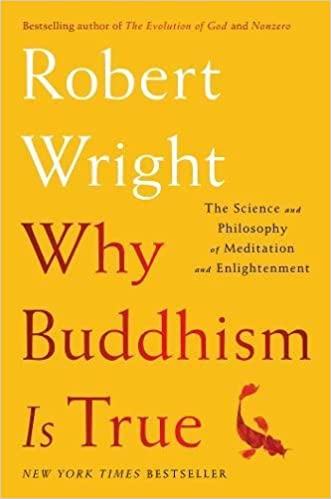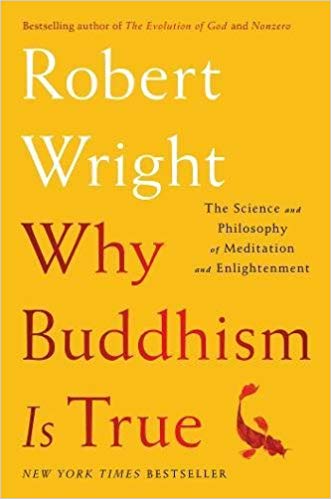Robert Wright – Why Buddhism is True Audiobook
Robert Wright – Why Buddhism is True Audiobook (The Science and Philosophy of Meditation and Enlightenment)

Why Buddhism is True Audiobook Obtain
As Wright sees it, ‘The Fact’ of the human situation is to be found in pure choice, as defined with evolutionary psychology in his early book The Ethical Pet: Why We Are, the Means We Are: The New Scientific Analysis of Evolutionary Psychology. And likewise he means that this actuality is uniquely resolved by ‘The Means’ of Buddhism, or at the least naturalistic Buddhism. This ‘nonreligious Buddhism’ is Buddhism with out reincarnation, spirits or gods. Additionally the precept of full or lengthy-time period information is held at arms size.
Nonreligious, naturalistic Buddhism rests on a couple of very important ideas: the suggestion that people do not have a necessary ‘self’ (no-self), the idea that frustration (dukkha) is attributable to the ‘hedonic treadmill’ of search of satisfaction and likewise evasion of ache, which meditation will help us to go away this treadmill. Why Buddhism is True Audiobook Free. The philosophical technique resembles that of Stephen Batchelor in Confession of a Buddhist Atheist in addition to Secular Buddhism: Visualizing the Dharma in an Unsure Globe.
There is a decidedly Gnostic curved to the composing right here, proper from the beginning, when the movie The Matrix is cited. Proper right here pure choice is the method which holds us in a state of false impression, contorts our understandings of fact, avoids us from experiencing lasting contentment and likewise full satisfaction, and retains us caught on the hedonic treadmill. And likewise secular-Buddhism is The Means (the ‘crimson capsule’) that may actually free us from this limitless drama of deception and likewise aggravation. This view of development stands in vital distinction with that of Wright’s earlier book, The Growth of God (Again Bay Viewers’ Choose), by which natural and likewise social evolution are as an alternative ‘divine’ processes by which the Glorious turns into present on the planet. (The God-as-Evolution view is likewise that of the ‘Integral’ spirituality of Ken Wilber, Steve McIntosh, and others.).
A part of this publication is dedicated to revealing that the important thing ideas of secular-Buddhism are clinically true, by dialog of analysis research in psychology in addition to neuroscience (a method confirmed Getting up: A Information to Spirituality With out Faith, by Sam Harris). This might be far more convincing if the analysis research have been talked about as a way of evaluating Buddhism in opposition to competing ideas of wellness, akin to trendy-day favorable psychology, but the book usually avoids the sort of direct comparability. This is reflective of the essential technique of secular-Buddhism: the ideas which do not uncover help in scientific research, akin to reincarnation, or lasting enlightenment, are deserted or de-emphasised. Secular-Buddhism is reformulating Buddhism to be much more common with modern psychology, a dynamic which complicates the inquiry of whether or not science will be utilized to disclose that ‘Buddhism is True’.
Wright will increase on the concept of ‘no-self’ by presenting a ‘modular’ mannequin of the thoughts. The suggestion is that our thoughts is composed of parts with completely different goals, wants, and assumed patterns. The parts scramble and tackle one another on the unconscious stage. Simply when amongst them lugs a totally sturdy feeling, can we then turn out to be conscious of its related thought on a acutely aware diploma. Whereas Wright discovers some help for this modular design from the Understanding Reflection college, and likewise from emotional analysis, he creates it by his personal beneficial viewpoint of transformative psychology (Darwinian opponents throughout the unconscious thoughts). Apparently, the design is included counsel how mindfulness can enhance our ‘self’- management, and to weaken the pull of indulgent or addictive actions.
Among the many pleasures of The Growth of God was its thorough historic examples of the strategies which the ‘religious business’ of competing ideas, and likewise the wants of distributors, kings, in addition to leaders all affected the development of historical Judaism, Christianity, and Islam. Wright can have likewise taken this method with Buddhism, discovering how its historical past because the state religion of a number of empires has really shaped its growth over time and placement. I used to be wishing for this, and likewise am let down to not uncover it proper right here. Nonetheless, Wright as an alternative manages to deal with some somewhat delicate considerate considerations, akin to the excellence between the Buddhist precept of ’em ptiness’ (sunyata) in addition to Hindu non-dualism, in a fashion that is unusually out there. He enlivens the dialogue with narrative accounts of previous discussions in addition to interviews.
This publication is in lots of means a private account: Wright has really discovered a model of secular-Buddhism that holds true for him in his life, and he is bringing us alongside together with his expertise and likewise assumed process. Not like quite a few authors on Jap spirituality, he is in no different manner trying to current himself as enlightened, or a religious trainer or skilled. He is refreshingly unpretentious– humorously self-effacing, and likewise clear about his inspirations for creating. And likewise he is a transparent author– he doesn’t attempt to frighten us with obtuseness and thriller, additionally when resolving difficult ideas. Information is not continually persuading, but it is partaking, pleasant, and likewise thought-scary. Just like the creator, I likewise occurred a ten-day Vipassana reflection hideaway almost twelve years earlier. I had an analogous expertise. Robert Wright – Why Buddhism is True Audio Book Download. I didn’t final all ten days (I left after 7 days – with authorization from the trainer) as a result of the discourse that went together with the resort was not pleasing the inquiries that have been effervescent up in my thoughts. As a result of that point I’ve struggled to grasp and specific the principle tenet of Buddhism – Vacuum. Just like the creator, I want explanations which might be based mostly in science and reduce lingo as excessive as attainable. This publication is a gift. (And likewise I’ll supply this publication as a gift to my associates and likewise members of the family.) If you wish to be taught and likewise follow mindfulness meditation, studying this book might remodel your life. Wright makes use of his particular person expertise and likewise his artwork of composing lucidly and eloquently (I moreover cherished Wright’s The Moral Animal) to soak up knowledge from transformative biology and psychology to make this publication full of insights in addition to information. A gem.
